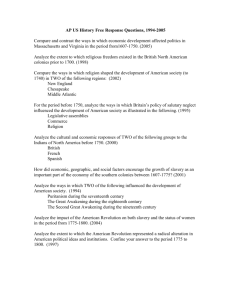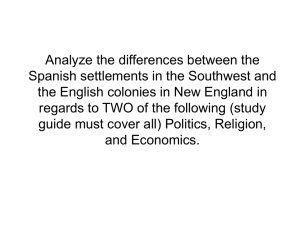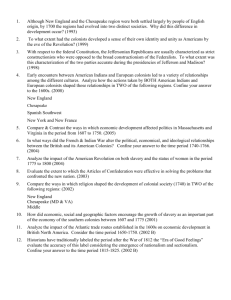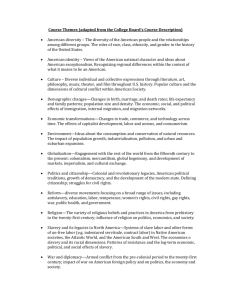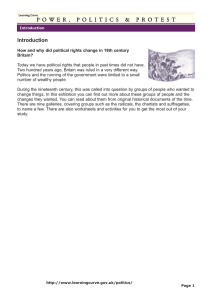AP US History Sample Extended Response Questions
advertisement
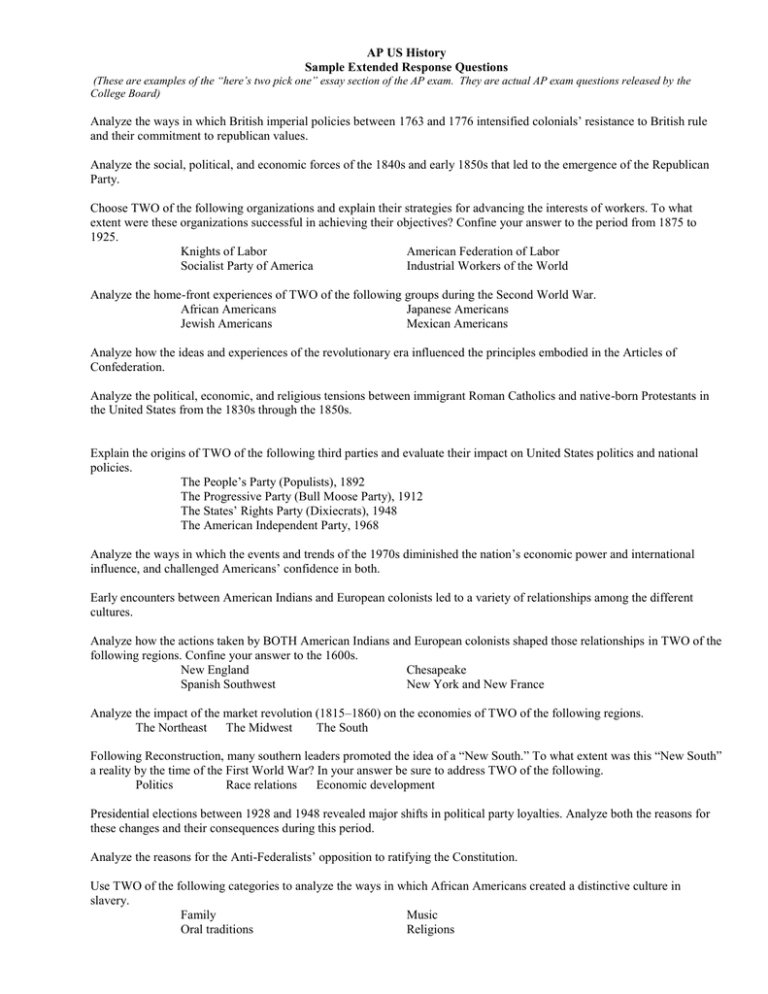
AP US History Sample Extended Response Questions (These are examples of the “here’s two pick one” essay section of the AP exam. They are actual AP exam questions released by the College Board) Analyze the ways in which British imperial policies between 1763 and 1776 intensified colonials’ resistance to British rule and their commitment to republican values. Analyze the social, political, and economic forces of the 1840s and early 1850s that led to the emergence of the Republican Party. Choose TWO of the following organizations and explain their strategies for advancing the interests of workers. To what extent were these organizations successful in achieving their objectives? Confine your answer to the period from 1875 to 1925. Knights of Labor American Federation of Labor Socialist Party of America Industrial Workers of the World Analyze the home-front experiences of TWO of the following groups during the Second World War. African Americans Japanese Americans Jewish Americans Mexican Americans Analyze how the ideas and experiences of the revolutionary era influenced the principles embodied in the Articles of Confederation. Analyze the political, economic, and religious tensions between immigrant Roman Catholics and native-born Protestants in the United States from the 1830s through the 1850s. Explain the origins of TWO of the following third parties and evaluate their impact on United States politics and national policies. The People’s Party (Populists), 1892 The Progressive Party (Bull Moose Party), 1912 The States’ Rights Party (Dixiecrats), 1948 The American Independent Party, 1968 Analyze the ways in which the events and trends of the 1970s diminished the nation’s economic power and international influence, and challenged Americans’ confidence in both. Early encounters between American Indians and European colonists led to a variety of relationships among the different cultures. Analyze how the actions taken by BOTH American Indians and European colonists shaped those relationships in TWO of the following regions. Confine your answer to the 1600s. New England Chesapeake Spanish Southwest New York and New France Analyze the impact of the market revolution (1815–1860) on the economies of TWO of the following regions. The Northeast The Midwest The South Following Reconstruction, many southern leaders promoted the idea of a “New South.” To what extent was this “New South” a reality by the time of the First World War? In your answer be sure to address TWO of the following. Politics Race relations Economic development Presidential elections between 1928 and 1948 revealed major shifts in political party loyalties. Analyze both the reasons for these changes and their consequences during this period. Analyze the reasons for the Anti-Federalists’ opposition to ratifying the Constitution. Use TWO of the following categories to analyze the ways in which African Americans created a distinctive culture in slavery. Family Music Oral traditions Religions Early encounters between American Indians and European colonists led to a variety of relationships among the different cultures. Analyze how actions taken by BOTH American Indians and European colonists shaped those relationships in TWO of the following regions. Confine your answer to the 1600s. New England Chesapeake Spanish Southwest New York and New France Analyze the differences between the Spanish settlements in the Southwest and the English colonies in New England in terms of TWO of the following: Politics Religion Economic development Compare and contrast the ways in which economic development affected politics in Massachusetts and Virginia in the period from 1607-1750. Analyze the extent to which religious freedom existed in the British North American colonies prior to 1700. Compare the ways in which religion shaped the development of American society (to 1740) in TWO of the following regions: New England Chesapeake Middle Atlantic Analyze the cultural and economic responses of TWO of the following groups to the Indians of North America before 1750. British French Spanish How did economic, geographic, and social factors encourage the growth of slavery as an important part of the economy of the southern colonies between 1607-1775? For the period before 1750, analyze the ways in which Britain’s policy of salutary neglect influenced the development of American society as illustrated in the following. Legislative assemblies Commerce Religion Analyze the ways in which British imperial policies between 1763 and 1776 intensified colonials’ resistance to British rule and their commitment to republican values. Analyze the ways in which TWO of the following influenced the development of American society. Puritanism during the seventeenth century The Great Awakening during the eighteenth century The Second Great Awakening during the nineteenth century Settlers in the 18th century American backcountry sometimes resorted to violent protest to express their grievances. Analyze the causes and significance of TWO of the following: March of the Paxton Boys Regulator movement Shays’ Rebellion Whiskey Rebellion Analyze the political, diplomatic, and military reasons for the United States victory in the Revolutionary War. Confine your answer to the period 1775–1783. Analyze the impact of the American Revolution on both slavery and the status of women in the period from 1775-1800. Analyze the extent to which the American Revolution represented a radical alteration in American political ideas and 2 institutions. Confine your answer to the period 1775 to 1800. In what ways did the Second Great Awakening in the North influence TWO of the following: Abolitionism Temperance The cult of domesticity Utopian communities Analyze the degree to which the Articles of Confederation provided an effective form of government with respect to any TWO of the following. Foreign relations Economic conditions Western lands Evaluate the extent to which the Articles of Confederation were effective in solving the problems that confronted the new nation. Analyze the contributions of TWO of the following in helping establish a stable government after the adoption of the Constitution. George Washington John Adams Thomas Jefferson Evaluate the relative importance of domestic and foreign affairs in shaping American politics in the United States in the 1790’s. Discuss the impact of territorial expansion on national unity between 1800 and 1850. Analyze the impact of the market revolution (1815-1860) on the economies of TWO of the following regions. The Northeast The Midwest The South Analyze the extent to which TWO of the following influenced the development of democracy between 1820 and 1840. Jacksonian economic policy Changes in electoral politics Second Great Awakening Westward movement How did TWO of the following contribute to the reemergence of a two party system in the period 1820-1840? Major political personalities States’ rights Economic issues The Jacksonian Period (1824-1848) has been celebrated as the era of the “common man.” To what extent did the period live up to its characterization? Consider TWO of the following in your response. Economic development Politics Reform movements Analyze the ways in which supporters of slavery in the nineteenth century used legal, religious, and economic arguments to defend the instruction of slavery. Analyze the social, political, and economic forces of the 1840s and early 1850s that led to the emergence of the Republican Party. Assess the moral arguments and political actions of those opposed to the spread of slavery in the context of TWO of the following. Missouri Compromise Mexican War 3 Compromise of 1850 Kansas-Nebraska Act In what ways did developments in transportation bring about economic and social change in the United States in the period 1820 to 1860? Analyze the effectiveness of political compromise in reducing sectional tensions on the period from 1820 to 1861. To what extent did the debates about the Mexican War and its aftermath reflect the sectional interests of New Englanders, westerners, and southerners in the period from 1845-1855? Analyze the ways in which controversy over the extension of slavery into western territories contributed to the coming of the Civil War. Confine your answer to the period 1845–1861. How and why did transportation developments spark economic growth during the period from 1860 to 1900 in the United States? Compare and contrast the attitudes of THREE of the following toward the wealth that was created in the United States during the late nineteenth century. Andrew Carnegie Eugene Debs Horatio Alger Booker T. Washington Ida M. Tarbell Explain why and how the role of the federal government changed as a result of the Civil War with respect to TWO of the following during the period 1861-1877: Race relations Economic development Westward expansion Analyze the economic consequences of the Civil War with respect to any TWO of the following in the United States between 1865 and 1880. Agriculture Labor Industrialization Transportation Evaluate the impact of the Civil War on political and economic developments in TWO of the following regions: The North The South The West Focus your answer on the period between 1865 and 1900. Analyze the impact of any TWO of the following on the American industrial worker between 1865 and 1900. Government actions Immigration Labor unions Technological changes How were the lives of the Plains Indians in the second half of the nineteenth century affected by technological developments and government actions? Analyze the reasons for the emergence of the Populist movement in the late nineteenth century. Choose TWO of the following organizations and explain their strategies for advancing the interests of workers. To what extent were these organizations successful in achieving their objectives? Confine your answer to the period from 1875 to 1925. Knights of Labor American Federation of Labor 4 Socialist Party of America Industrial Workers of the World Following Reconstruction, many southern leaders promoted the idea of a "New South." To what extent was this "New South" a reality by the time of the First World War? In your answer be sure to address TWO of the following: Economic Development Politics Race relations To what extent did the role of the federal government change under President Theodore Roosevelt in regard to TWO of the following: Labor Trusts Conservation World Affairs Analyze the roles that women played in Progressive Era reforms from the 1880s through 1920. Focus your essay on TWO of the following. Politics Social conditions Labor and working conditions Compare and contrast the programs and policies designed by reformers of the Progressive era to those designed by the reformers of the New Deal period. Confine your answer to programs and policies that addressed the needs of those living in poverty. To what extent did the United States achieve the objectives that led it to enter the First World War? Assess the relative influence of THREE of the following in the American decision to declare war on Germany in 1917. German naval policy American economic interests Woodrow Wilson’s idealism Allied propaganda America’s claim to world power In what ways did economic conditions and developments in the arts and entertainment help create the reputation of the 1920’s as the Roaring Twenties? Historians have argued that Progressive reform lost momentum in the 1920’s. Evaluate this statement with respect to TWO of the following: Regulation of business Labor Immigrants Describe and account for the rise of nativism in American society from 1900 to 1930. To what extent and why did the United States adopt an isolationist foreign policy in the 1920’s and 1930’s? Analyze the ways in which the Great Depression altered the American social fabric in the 1930’s. Compare and contrast United States foreign policy after the First World War and after the Second World War. Consider the periods 1919-1928, and 1945-1950. Analyze the home-front experiences of TWO of the following groups during the Second World War. African Americans Japanese Americans Jewish Americans Mexican Americans Presidential elections between 1928 and 1948 revealed major shifts in political party loyalties. Analyze both the reasons for 5 these changes and their consequences during this period. Analyze the influence of TWO of the following on American-Soviet relations in the decade following the Second World War. Yalta Conference Communist revolution in China Korean War McCarthyism Analyze the successes and failures of the United States Cold War policy of containment as it developed in TWO of the following regions of the world during the period 1945-1975. East and Southeast Asia Europe Latin America Middle East Assess the success of the United States policy of containment in Asia between 1945 and 1975. How do you account for the appeal of McCarthyism in the United States in the era following the Second World War? Compare and contrast United States society in the 1920’s and 1950’s with respect to TWO of the following: Race relations Role of women Consumerism To what extent did the 1950’s deserve its reputation as an age of political, social, and cultural conformity? While the United States appeared to be dominated by consensus and conformity in the 1950’s, some Americans reacted against the status quo. Analyze the critiques made of American society made by TWO of the following: Youth Civil Rights activists Intellectuals How did the African-American Civil Rights movement of the 1950’s and 1960’s address the failures of the Reconstruction? Discuss, with respect to TWO of the following, the view that the 1960’s represented a period of profound cultural change. Education Gender roles Music Race relations Describe the patterns of immigration in TWO of the periods below. Compare and contrast the responses of Americans to immigrants in these periods. 1820 to 1860 1880 to 1924 1965 to 2000 “1968 was a turning point for the United States.” To what extent is this an accurate assessment? In your answer, discuss TWO of the following: National politics Vietnam War Civil Rights Analyze the extent to which TWO of the following transformed American society in the 1960’s and 1970’s. The Civil Rights movement The antiwar movement The women’s movement Landslide presidential victories do not ensure continued political effectiveness or legislative success.” Assess the validity of this statement by comparing TWO of the following presidential administrations. 6 Franklin Roosevelt (1936) Lyndon Johnson (1964) Richard Nixon (1972) Ronald Reagan (1984) Explain the causes and consequences of TWO of the following population movements in the United States during the period 1945–1985. Suburbanization The growth of the Sun Belt Immigration to the United States Analyze the origins and development of slavery in Britain’s North American colonies in the period 1607 to 1776. To what extent did political parties contribute to the development of national unity in the United States between 1790 and 1840? Compare and contrast the ways that many Americans expressed their opposition to immigrants in the 1840s–1850s with the ways that many Americans expressed their opposition to immigrants in the 1910s–1920s. African American leaders have responded to racial discrimination in the United States in a variety of ways. Compare and contrast the goals and strategies of African American leaders in the 1890s –1920s with the goals and strategies of African American leaders in the 1950s –1960s. 7
